Table of Contents
Many nutritionists consider the avocado, which is native to the region stretching from the central highlands of Mexico to the Pacific Coast of Central America, to be one of the healthiest fruits in the world. This is because, unlike most other fruits, these green-skinned, single-seeded berries are rich in beneficial fats that are proven to boost our health in countless ways.
However, avocados are also bursting with many other nutrients lacking in the Western diet, making them an excellent “all-round” food for correcting deficiencies and tackling diseases. This article takes a closer look at the health benefits of this often misunderstood fruit, which deserves far more attention in the Western world than it currently receives.
Did you know?
Native to Mexico and Central America, the avocado tree (Persea americana) has been cultivated for culinary use for centuries. However, the most commercially popular avocado today is the Hass avocado, which was discovered by the American horticulturist Rudolph Hass in California in 1926. Indeed, the Hass cultivar accounts for no less than 80% of all avocados grown worldwide, and its popularity continues to rise.
Therefore, assume that most of the research featured in this article relates to the Hass avocado unless stated otherwise.
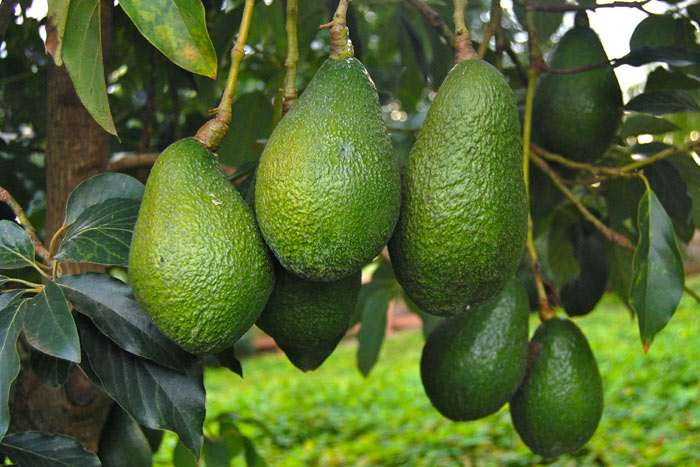
A Hass avocado tree
Why Are Avocados Good for You?

According to NutritionData, 1 avocado (201g) is:
What impresses me about the avocado’s nutritional profile is how well-rounded it is. Almost all the essential vitamins and minerals are represented here, with the exceptions of those we wouldn’t expect to find in plant foods, such as vitamins D and B12. Furthermore, avocados are a complete protein source, meaning that they contain all 9 essential amino acids required for proper cell growth, which is something we don’t see often in the plant world.
However, avocado’s greatest health benefits stem from its high concentrations of beneficial fatty acids. According to research published in Critical Reviews in Food Science and Nutrition, the fat content of the average Hass avocado is approximately 71% monounsaturated fatty acids (mostly oleic acid and palmitoleic acid), 16% saturated fatty acids (mostly palmitic acid) and 13% polyunsaturated fatty acids (mostly linoleic acid) (1). As we’re about to find out, though, oleic acid is the healthiest fat in this greatest of fruits.
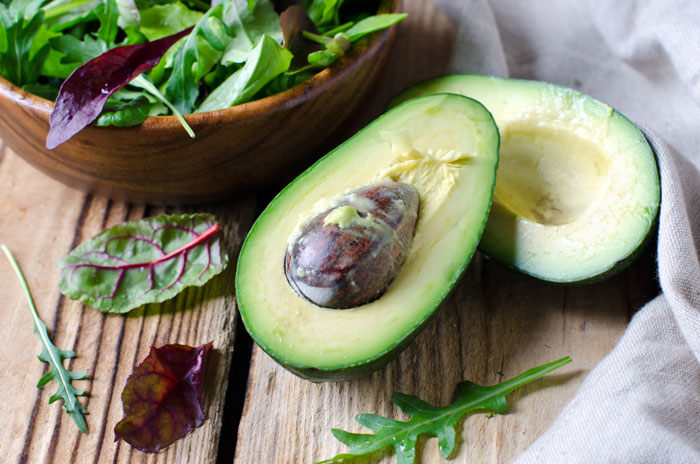
The greatest, I tell you
Research into the Health Benefits of Avocados
Rich in Heart-Healthy Oleic Acid
Oleic acid is a monounsaturated omega-9 fatty acid found in significant amounts in avocados. Though its health benefits are wide-ranging and extensive, studies into oleic acid – of which there are hundreds – mostly focus on its considerable ability to boost cardiovascular health. For example, check out what the following studies have concluded about this amazing substance:
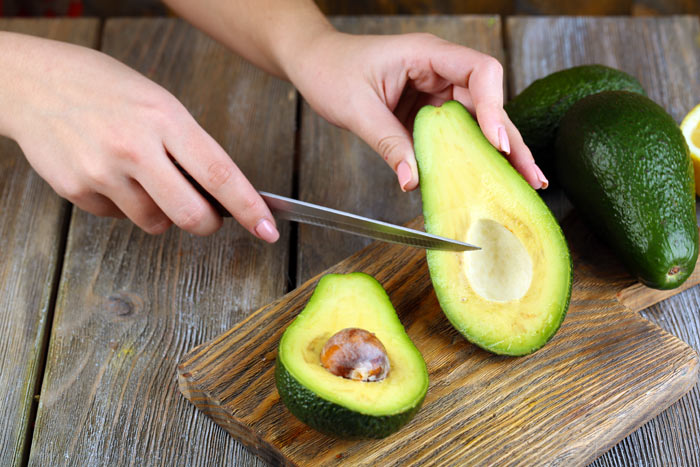
Let’s take a quick break from the science to admire another halved avocado
The bottom line is that oleic acid has been proven, time and time again, to improve factors associated with heart disease and type II diabetes. Indeed, if these results are to be believed, simply adding one avocado to your daily diet could help prevent, and possibly even treat, many of the cardiovascular issues that plague the modern world.
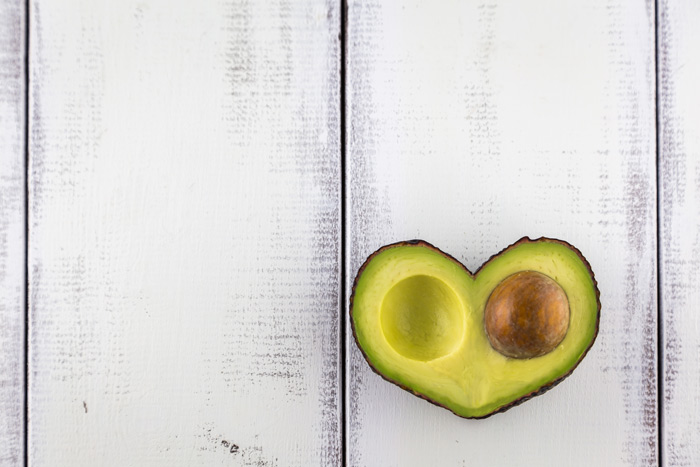
Avocados: they’re good for your heart
Did you know?
Olive oil (another great source of oleic acid) is a principal component of the Mediterranean Diet, a modern eating plan inspired by the traditional dietary patterns of Spain, Greece and southern Italy. Given what we know about oleic acid, it wouldn’t surprise me if this is why the people of these countries tend to enjoy such longevity compared to the rest of us in Europe and North America.
Fat Burning and Weight Loss Properties
If you’ve been reading this website for a while, you’ve probably learned that natural fats – contrary to everything we were taught in school – can help burn fat rather than add it to our thighs. This is true of the medium-chain triglycerides in coconut oil, it’s true of the DHA and EPA in oily fish, and it’s also true of the oleic acid in avocados.
One study published in the Journal of Internal Medicine, for instance, found that an oleic acid-enriched diet was effective in decreasing the body weight (and stabilizing the cholesterol levels) of mildly obese women (9). A later study, published in The American Journal of Clinical Nutrition, also found that while increased consumption of palmitic acid (a saturated fatty acid common in palm oils) decreased fat oxidation and daily energy expenditure in young adults, increased consumption of oleic acid had the opposite effect (i.e., it reduced the risk of obesity and insulin resistance) (10).
In other words, oleic acid and other monounsaturated fatty acids appear to possess natural fat burning properties that are not present in certain saturated fats… though we don’t fully understand how they work just yet.
Additionally, avocados contain other properties that also promote weight loss:
The result? An unlikely but effective weight loss food.
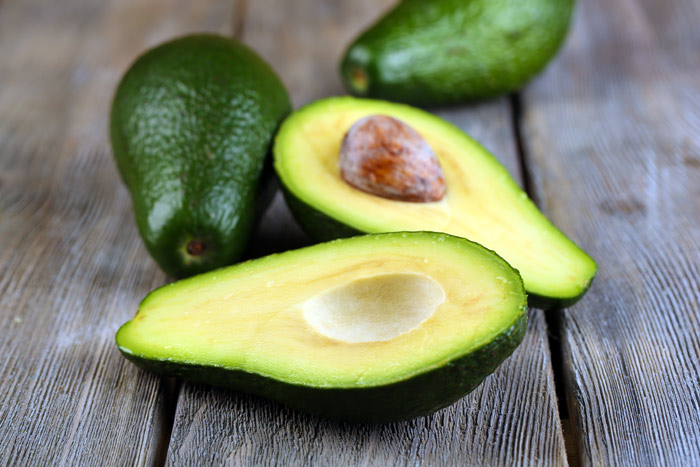
Who would have thought it?
Rich in Beneficial Plant Compounds
Avocados are also packed with numerous plant compounds proven to boost our health. These include:
Did you know?
Though little research has been conducted on this subject, beta-Sitosterol is also known to possess anti-estrogenic properties due to its ability to inhibit the activity of aromatase, the enzyme responsible for estrogen biosynthesis. For this reason, it wouldn’t surprise me if avocados, which contain much more beta-Sitosterol than most other plant foods, are eventually proven to possess hormone stabilizing properties for both men and women. Until more research comes in, though, I’ll refrain from adding this benefit to the list.

Raw, chopped avocado is a fantastic addition to any salad
Summary of Avocado’s Benefits
One of the fruit world’s finest sources of nutrition, the avocado is packed with essential vitamins and minerals, and can help correct many of the most common nutrient deficiencies we face today (especially vitamin K and magnesium). Avocados are also rich in several antioxidant compounds associated with the prevention and treatment of inflammation, age-related macular degeneration, cancer and – potentially – hormone imbalances.
However, the sharpest bow in the avocado’s quiver is its high concentrations of oleic acid, an omega-9 fatty acid whose benefit to our cardiovascular system is extensive and well-researched. Indeed, research suggests that adding just one oleic acid-rich avocado to our daily diets could guard us from numerous cardiovascular issues implicated in the development of type 2 diabetes and heart disease. Oleic acid’s fat-burning properties are also noteworthy, and complement the weight loss properties inherent within the avocado itself.
Ultimately, avocados are suitable for almost everyone, especially those on low carb or ketogenic diets.
Selecting and Storing Avocados
Smaller Californian avocados, such as the Hass avocado, tend to be oilier and higher in fat than the larger Floridian ones, making them the most desirable in terms of nutrition. Avocados that yield to gentle pressure are usually the ripest and should be consumed within a day or two. Unripe avocados are usually much firmer and take between four and five days to ripen at room temperature.
Avocados fall into the “no need to purchase organic” category, since their thick peel prevents the edible flesh from absorbing the harshest pesticides and herbicides. I still recommend purchasing organic avocados when possible, however, since (a) you’ll have complete peace of mind regarding potential contamination, and (b) you’ll be supporting companies that are, in general, much more ethical and sustainable than their non-organic rivals.
Cooking with Avocados and Avocado Oil
Since avocados are rich in monounsaturated fatty acids, which are proven to tolerate heat, cooking avocados will not significantly impact their fatty acid composition. Cooking with avocado oil is also safe for the same reason, though high-quality avocado oil tends to be much more expensive than high-quality olive oil (with which it shares a similar nutritional composition).
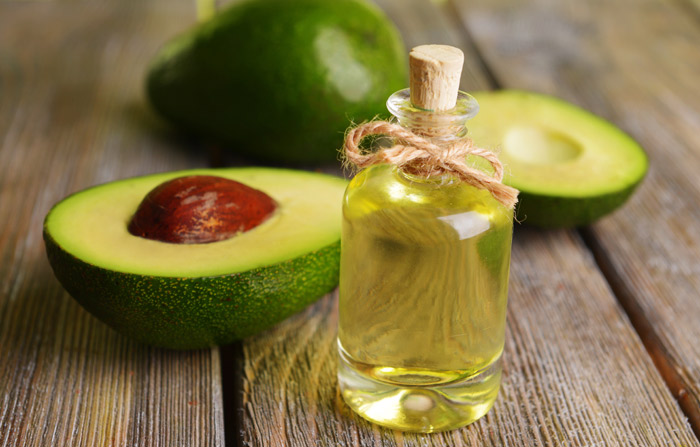
Avocado oil tolerates high temperatures, making it a suitable cooking oil
Make Your Own Guacamole
No article about avocados is complete without a guide to making your own guacamole. So, without further ado, here’s the ultimate way to make this much-loved Mexican dip!
And that’s it! All ingredients should be organic and fresh when possible, and the guacamole should be served immediately to ensure the best possible taste (though it can be stored in the fridge for a day or so if kept in an air-tight container).

Guacamole is surprisingly easy to make
I cannot recommend serving guacamole with tortilla chips because… y’know… wheat is probably the single worst food in the Standard American Diet. Therefore, I suggest either serving it with gluten-free chips (kale chips are my favorite) or vegetable sticks.







